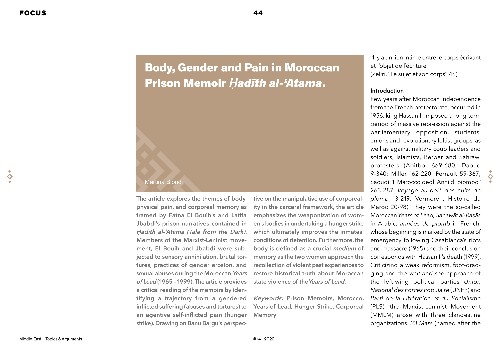Body, Gender and Pain in Moroccan Prison Memoir Ḥadīth al-‘Atama
The article explores the themes of body, physical pain, and corporeal memory as framed by Fatna El Bouih’s and Latifa Jbabdi’s prison narratives contained in Ḥadīth al-‘Atama (Tale from the Dark). Members of the Marxist-Leninist movement, El Bouih and Jbabdi were subjected to sensory annihilation, b...
Spremljeno u:
| Izdano u: | Middle East - Topics & Arguments |
|---|---|
| Glavni autor: | |
| Format: | Artikel (Zeitschrift) |
| Jezik: | engleski |
| Izdano: |
Philipps-Universität Marburg
2020
|
| Teme: | |
| Online pristup: | Online pristup |
| Oznake: |
Bez oznaka, Budi prvi tko označuje ovaj zapis!
|
| Sažetak: | The article explores the themes of body, physical pain, and corporeal memory as framed by Fatna El Bouih’s and Latifa Jbabdi’s prison narratives contained in Ḥadīth al-‘Atama (Tale from the Dark). Members of the Marxist-Leninist movement, El Bouih and Jbabdi were subjected to sensory annihilation, brutal tortures, practices of gender erosion, and sexual abuses during the Moroccan Years of Lead (1965 – 1999). The article provides a critical reading of the memoirs by identifying a trajectory from a gendered inflicted suffering (abuses and tortures) to an agentive self-inflicted pain (hunger strike). Drawing on Banu Bargu’s perspective on the manipulative use of corporeality in the carceral framework, the article emphasizes the weaponization of women’s bodies in undertaking a hunger strike which ultimately improves the inmates’ conditions of detention. Furthermore, the body is defined as a crucial medium of memory as the two women approach the recollection of violent past experiences to restore historical truth about Moroccan state violence of the Years of Lead. |
|---|---|
| Digitalni identifikator objekta: | 10.17192/meta.2020.14.8259 |
